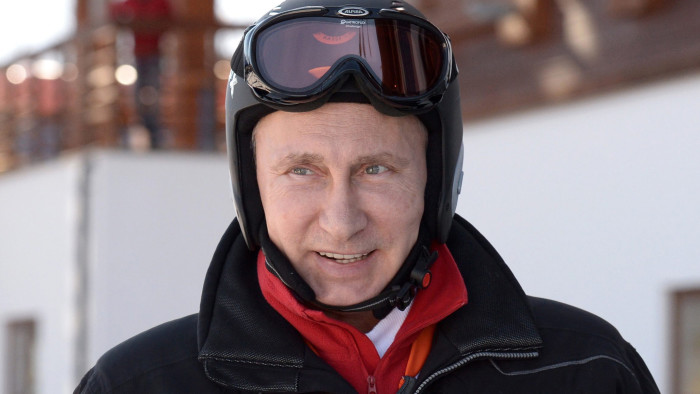Russia: Post-Soviet struggles bring on existential crisis

Roula Khalaf, Editor of the FT, selects her favourite stories in this weekly newsletter.
When the Black Sea resort city of Sochi greets athletes from all over the world on February 7, it will be showcasing much more than sport. Russia, the host of the 2014 Winter Olympics, wants to mark its return to the world stage not just as a cradle of culture and civilisation, but, critically for President Vladimir Putin, as a resurgent global power.
For now, Sochi is a fortress. Faced with the risk of terrorist attacks from jihadist insurgents in the North Caucasus – with two deadly bombings on the last two days of 2013 serving as a grim reminder – Moscow has transformed the city and the Olympic venues on the adjoining Caucasus slopes into an ironclad zone closed to anyone but athletes, registered visitors and security personnel.
The sense of threat extends far beyond Sochi. In contrast to the confident image Moscow wants to convey in the Olympic celebrations, Russia is undergoing an existential crisis.
Not only do Russians still ache from the loss of the country’s superpower status after the demise of the Soviet Union more than two decades ago, but the country also struggles with a shrinking population, a crumbling industrial base and perceived hostility towards it on all fronts.
“Where did our great country go?” is a lament shared by dozens of interviewees – supporters and critics of the defunct socialist system alike – in Second-Hand Time, an account of the demise of the Soviet Union by Svetlana Alexievich, a Belarusian journalist.
Economists have long argued that Russia must balance its overreliance on natural resources by investing more of its oil and gas revenues into modernising its infrastructure and building manufacturing capacity.
But a long run of high oil prices before the financial crisis gave little incentive for change. And by the time the crisis bit, the interests of the over-dominant state-owned energy companies were so entrenched that advocates of reform inside the government have been unable to force change.
“We have lost our manufacturing base,” says Yury Krupnov, an analyst at the Moscow-based Institute for Demography, Migration and Regional Development. “We have become addicted to an economic model centred on commodities exports.”
Externally, Mr Putin has created the impression of a resurgent Russia with two stunning foreign policy victories – Moscow’s Syria initiative, which helped broker a deal to destroy the country’s chemical weapons, and his derailing of Ukraine’s attempt to move closer to the European Union.
But observers see these as tactical short-term moves by a country that feels it is under siege. Hardly a day goes by without harsh words being exchanged between Moscow and some western government over Russia’s human rights record or its treatment of minorities.
“What I see is a Russia that is criticised and lectured by the west for everything,” says Victor Sumsky, a professor at MGIMO, the university that trains most of Russia’s future diplomats.
The brisk economic growth Russia had maintained alongside the other Brics emerging markets is also grinding to a halt. Moscow expects gross domestic product to have grown just 1.4 per cent in 2013. While upcoming data may show an uptick in the fourth quarter, it is likely to provide only temporary relief.
“The first quarter is likely to look really bad because the same period last year was quite strong,” says Chris Weafer, a senior partner at Macro Advisory, a Moscow-based consultancy. Like many other analysts, he argues that it is now or never for long-delayed structural reforms of the Russian economy.
Mr Putin surprised observers in December when he admitted for the first time that domestic policy failures were to blame for the sluggish growth.
But for investors, this was not news. Fixed investment stopped growing at all late last year, and both Russian entrepreneurs and foreign executives say they need Moscow to reassure them that private property will be protected and the courts allowed to operate independently.
Unfortunately, Mr Putin has played a major role in unsettling investors. His prosecution of Mikhail Khodorkovsky, once Russia’s richest man and co-owner of Yukos, then the country’s largest oil firm, is seen as the event that marked the end of a phase of economic and judicial reforms in Mr Putin’s first term.
Although he stunned the world last month by releasing Mr Khodorkovsky after 10 years behind bars, it is by no means clear that this heralds a change of course.
Recently, the president proposed restoring the right for prosecutors to start tax investigations against companies on their own, which entrepreneurs fear could lead to politically motivated raids on businesses.
When Dmitry Medvedev, the prime minister who has championed although failed to implement economic reforms, criticised the idea, Mr Putin publicly dressed him down.
A replacement of Mr Medvedev has long been rumoured. Once the Sochi party is over, those keen to take his place are certain to resume the fight.
Comments